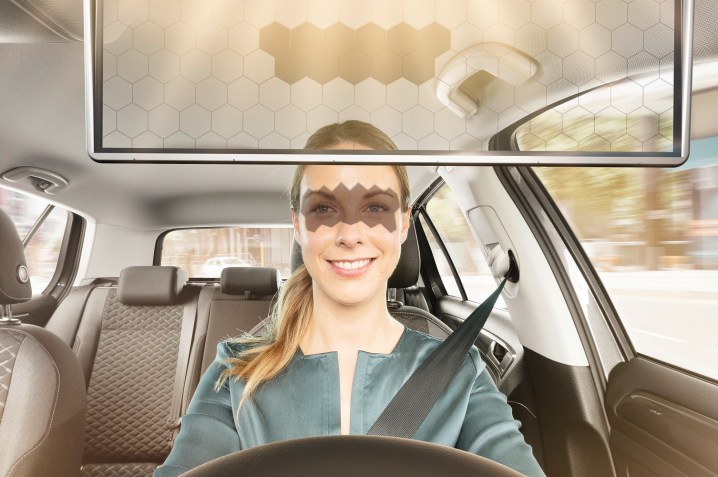
Bosch’s automotive division created a see-through sun visor called Virtual Visor that automatically darkens to prevent sunlight from hitting the front passengers’ eyes, while leaving their line of sight relatively clean. This artificial intelligence-powered technology was named Best of Innovation in the CES 2020 Innovation Awards.
The Virtual Visor is a flat, rectangular LCD screen with hexagon-shaped inserts that looks like a digital beehive. It folds down from the space right above the windshield like a regular sun visor, but, when it’s down, you see the outside world instead of looking at your face in a vanity mirror. The Virtual Visor sees you, though. Its cabin-facing camera detects facial features, like the nose and the mouth, and it also knows if the sun is casting a shadow on your face.
Artificial intelligence puts these puzzle pieces together. The software calculates where your eyes are, where the sun is shining, and it tints individual hexagons to prevent sunlight from blinding you and yours. It’s more like a pair of sunglasses than a traditional sun visor, and it’s far safer because the hexagons not blocking sunlight remain clear, so you can see through them. The Virtual Visor automatically adjusts in real-time as needed, so you don’t need to move it around.

“We discovered early in the development that users adjust their traditional sun visors to always cast a shadow on their own eyes. This realization was profound in helping simplify the product concept, and fuel the design of this technology,” explained Jason Zink, one of the Virtual Visor’s co-creators. Working with two other Bosch engineers, he built the first prototype using an LCD monitor fished out of the trash before getting the project approved and funded by executives.
Glare-free driving improves safety, according to Bosch. The company pointed to a 2017 study published in medical journal Medicine that concluded the risk of getting in a life-threatening crash is 16% higher in bright sunlight.
Bosch’s job is to bring innovation to the automotive sector, not to build the cars that use it. Digital Trends learned the company has stalked talking to car and truck manufacturers about making the Virtual Visor a reality, and a spokesperson told us its goal is to bring it to the market, but it’s too early to tell when, where, or how much it will cost.



